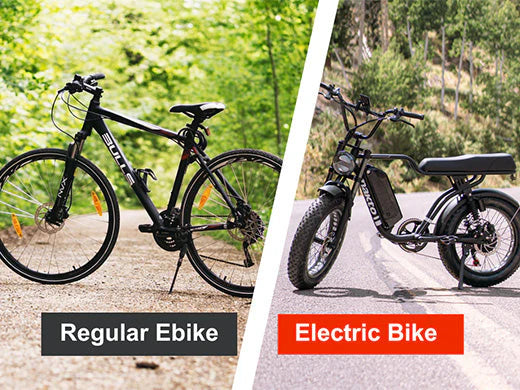When talking about bikes, the immediate question is, what type of bike? Electric Bike or Regular Bike? The follow-up question is, which one is better? The discussion is endless, with the pros and cons of both types of bikes.
Bicycles have changed drastically in the last couple of decades, and electric bikes are their finest example. However, some people still like to ride a regular bike, but electric bikes are the future of cycling. If you are wondering how electric bikes and regular bikes can be compared? The short answer is, "in every way."
The long answer includes their prices, speed, design, driving distance, and driving functions that can be compared for a better understanding. Everything is different, but not so much. Suppose biking is your newly formed leisure activity or a long-lost love.
In that case, you must be deciding between a regular bike or an electric bike. This article will discuss 10 differences between electric bikes vs regular bikes to equip you with the knowledge better to make an educated decision. So, without further delay, let's jump right in and discuss different electric and regular bikes' features.
Other article you need to know: Class 1 vs class 2 vs class 3 electric bike
Appearance and Mechanics
The main difference between a normal bike and an electric bike is the inclusion of an electrical driving system. This system consists of a battery, an electric motor, and a display screen. You may be wondering why a motor? This is what assists a rider while paddling.
The motor runs on the pre-installed battery and helps in propelling the electric bike forward. Some electric bikes have a throttle system in which a rider doesn't need to paddle to move forward.
All other parts are almost identical, both in regular and electric bikes. They have similar wheels, handles, brakes, pedals, and frame styles. Moreover, all these components work similarly, too.
So, if your concern is only the function of a bike, you must know that both have the same functions. However, if you are looking for some dashing designs, electric bikes have more versatility.
Maintenance and Repairs

As mentioned earlier, the components of regular and electric bikes are almost identical, so it is not too surprising to know that they need similar care for maintenance. Does it mean that there is no difference in the periodic maintenance too? Yes, that's what it means. Everything from typical repair visits to more planned annual maintenance is similar.
When you face a problem with the parts like brakes, wheels, or paddles of an electric bike, you need to go to the same repair shops as the case of regular bikes. To your surprise, when it comes to repairing costs, you need to pay the same amount.
You must be dying to know if there is anything that needs a different approach for the maintenance? Yes, there is something that needs extra care, and that is the motorized components of electric bikes.
Suppose you face a problem with the battery or motor of an electric bike. In that unfortunate event, you need to visit an electric bike specialist. Only he can diagnose the problem and, if possible, fix it or replace it.
You can avoid all this by purchasing a Nakto Bike with extremely durable electric components and excellent customer service that is always ready to help. Moreover, they come with a warranty that covers these repairs.
Riding Experience
This is debatable and also very subjective. Biking enthusiasts always differ in riding experience; some refer to electric bike riding as better than regular bikes and vice versa. So, is there any real difference between riding an electric bike vs a regular bike? Honestly speaking, there is none. Riding an electric bike is very similar to riding any other bike.
Does this mean the motor is useless? Hold on, don't go that far. Motor assists in paddling when you achieve a certain speed or manually adjust the level of assistance from a dialer.
Basically, you start paddling like a normal bike, and the motor starts assisting after some time. The transition is very smooth and sometimes does not even get noticed. The electric bike does not change the cycling process; rather, it makes it easy and smooth.
Almost every electric bike has a dialer on its handlebar for dialing up or down pedal assistance. If you increase the motor assistance, paddling becomes easy. On the other hand, your legs have to do most of the hard work in case of reduced paddle assistance.
The electric bike moves at the highest speed with little effort when you set the value of motor assistance to the maximum. Check out this video (Best Electric Bikes By Nakto) to listen to user reviews about Nakto electric bikes.
Rules and Regulations

If you are planning to buy an electric bike, you must be wondering about the rules and regulations. Are there any special rules that you need to follow while riding an electric bike, and not in the case of a regular bike? The answer is 'no.'
There is not much distinction between electric and regular bikes regarding rules and regulations. Both types of bikes are subject to similar government regulations regarding their speed and power limitations. However, these regulations do not impact riders.
Most of the electric bikes offered by Nakto do not require insurance or a permit. However, some states have additional rules like wearing a helmet, riding in a specific lane, or setting a minimum age limit to ride an electric bike.
The rule of thumb is to check with local authorities and municipal administration for any special rules for electric bikes before riding through the area.
Speed

This is another area of greatest debate between electric bikes and regular bike users. Does the electric bike run faster compared to an ordinary bike? Is it really quick? The answer is subjective because it depends on how quickly you want to ride.
Let me explain. Most of the motors installed in electric bikes propel bikes up to a speed between 20 to 28 MPH. It depends upon the power of a motor. If you want to ride faster than this, you have to paddle faster with your own legs. The motor will not assist you beyond 28 MPH.
On the other hand, riding an electric bike will help you maintain your energy level for a longer period. The reason is the effortless paddling of an electric bike compared to a regular bike. If you want to break speed records, don't buy an electric bike. However, if you are looking for simple and easy cycling, give it a go.
Fitness Levels

When it comes to fitness, a regular bike requires more energy and strength to ride than an electric bike. Why is that? Because an electric bike has paddle assistance while a regular bike doesn't. You have to push paddles on a regular bike without any motorized support, making you more tired.
Moreover, electric bikes can also act like regular bikes and need full manual effort when the motor is turned off. So, you can feel exhausted on your next trip around the city if you are using a regular bike. While an electric bike will not drain much of your energy due to its paddle assistance and throttle function.
The motor installed on an electric bike can be switched on and off manually. You can turn its assistance to a minimum when you feel like challenging yourself. If you use a bike for long distances, an electric bike should be your first choice. And what's better than an electric bike? A Nakto electric bike.
Electric Bike VS Regular Bike Cost

A basic regular bike can be purchased without much burden on the pocket. Most regular bikes can be purchased for as low as $200. However, some regular bikes can cost a whopping $10,000. On the other hand, an electric bike ranges from $600 to $8,000. The price of a bike depends on several factors like the power of a motor, material used, size, design, and model. The latest models cost more.
Whenever purchasing a regular bike or an electric bike, your first priority should be the bike's durability. If you rush to purchase without giving much thought to the quality of a bike, disappointment is inevitable. So, be patient, shortlist your requirements, do internet research, and watch biker reviews; after that, purchase a bike.
I also write other article is about ebike's cost: How Much Does an Electric Bike Cost?Weclome to clik it!
Maintenance and Repair Costs of Ebikes and Regular Bikes

Purchasing a bike is not a one-time investment, but it needs proper care and maintenance to stay functioning properly. Most of the time, the maintenance and repair cost of an electric bike is the same as a regular bike. And why is that? It's because of the similarity between electric and regular bikes' parts and components.
However, some integral parts of an electric bike are costly to repair and even costlier when being replaced. It includes the battery, electric motor, and digital displays. Replacing a battery can cost up to $900. An electric motor can put an extra burden of up to $300 if it needs replacement. The good news is a battery has a life expectancy of more than three years. Hence, it is not going to need replacement very often.
The Difference in Weight Between an eBike and a Regular Bike
Weight is also an area of concern before purchasing a bike, an electric one or otherwise. Electric bikes weigh more than regular bikes due to obvious reasons for additional equipment installed. Battery, electric motor, and a heavy frame give an electric bike a few extra pounds. The average weight of an electric motor ranges from 8 to 10 pounds, while a battery can weigh up to 7 pounds. A regular bike lacks both; hence it is lighter.
A regular bike can weigh anywhere between 18 to 25 pounds, unlike electric bikes that range from 38 to 70 pounds. That weight difference is almost double, which comes with its own limitations.
Lightweight regular bikes are easier to paddle than electric bikes when motorized assistance is switched off. The weight of an electric bike does not matter much when paddling with some degree of motor assistance. With motor assistance, you can increase speed while going uphill or off-road.
Electric Bikes and Regular Bikes Weight Capacity
It is vital to consider the weight capacity before choosing between an electric or regular bike. In general, both bikes can support the same amount of load. An electric bike can support up to 300 pounds of load, and so does a regular bike.
However, certain models can support more than 300 pounds. Some electric bike models available in the market can support more than 500 pounds of weight which is huge for a bike.
You can always modify a bike, electric or regular, to support extra pounds. Some companies can do it for you if you have special weight requirements.
Choosing a bike with fat tires is safe to support more weight. According to your needs, there are several fat tire models available at Nakto bike.
Conclusion
Purchasing a bike is an investment that can save you some money and, at the same time, make you healthier. There are many options available in the market to let you start your cycling journey. However, it is important to assess all the available options to make an informed decision.
There are two main options: an electric bike and a regular bike. Choosing between these will influence your further journey because these bikes need different approaches, from money to physical health and riding experience.
This article has made it easy to decide on your future bike. It covers all the similarities and differences between an electric bike and a regular bike. Go through the article to assess different bikes that resonate with your requirements and budget.
Always follow the rules and regulations of the local authorities to avoid getting into trouble. Moreover, wear safety gear when going on a ride. Last but not least, always take care of your bike, keep it well oiled, and keep it checked for periodic maintenance. It will increase its life tremendously.

